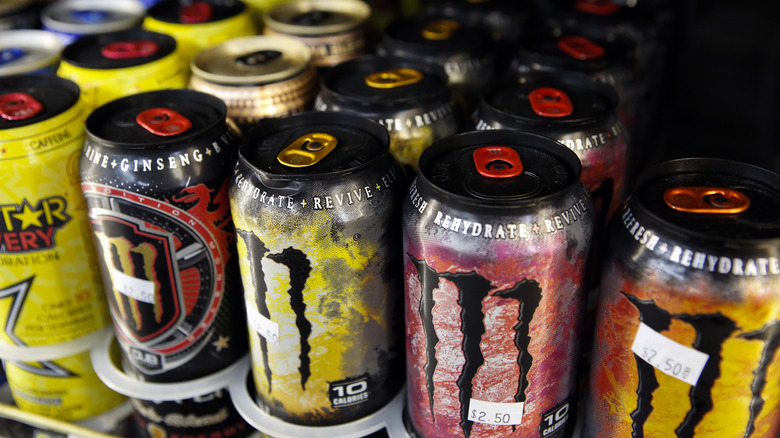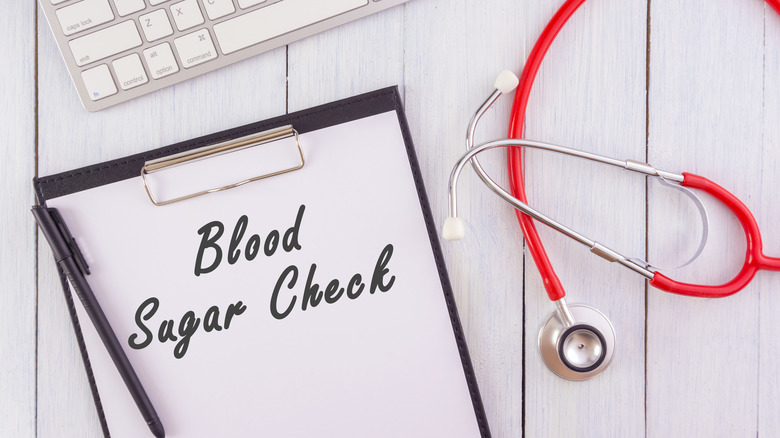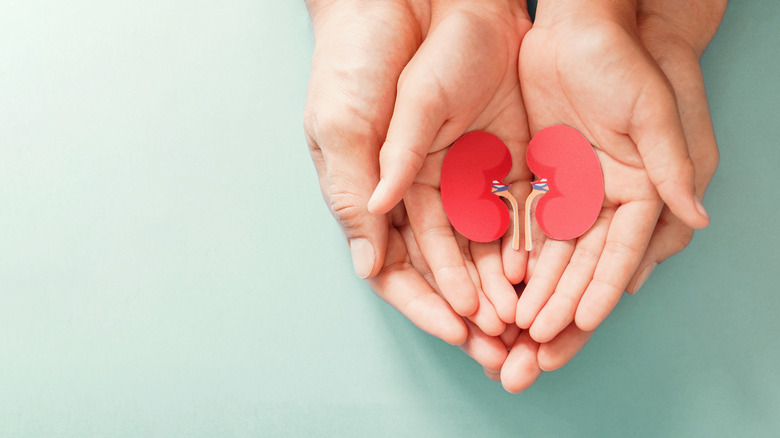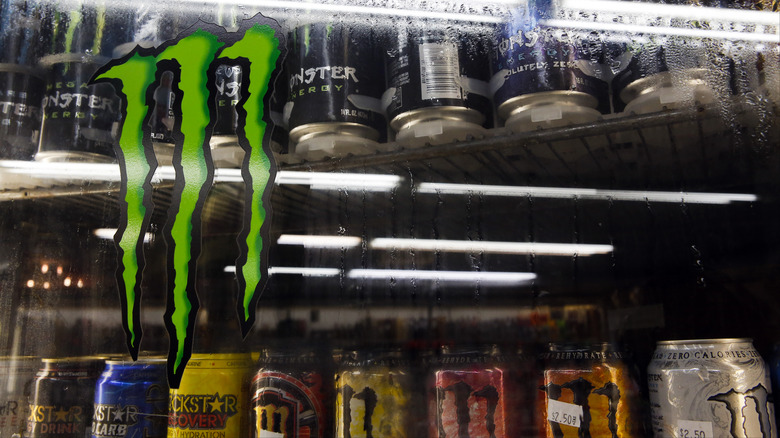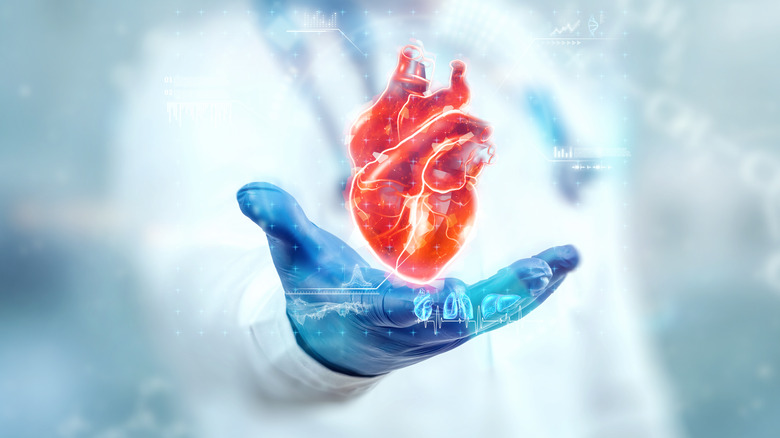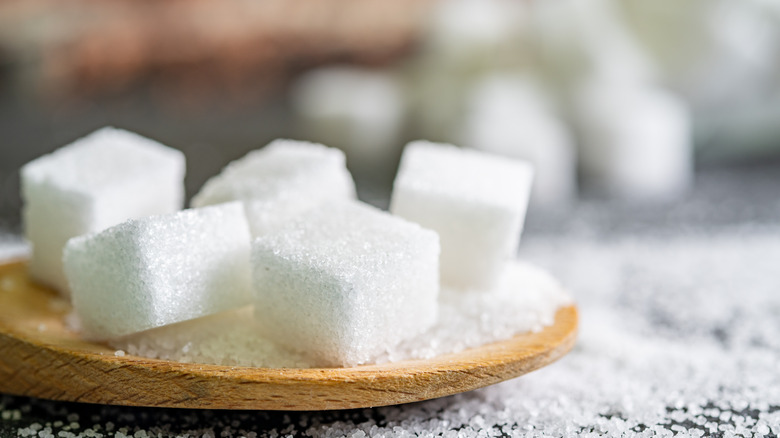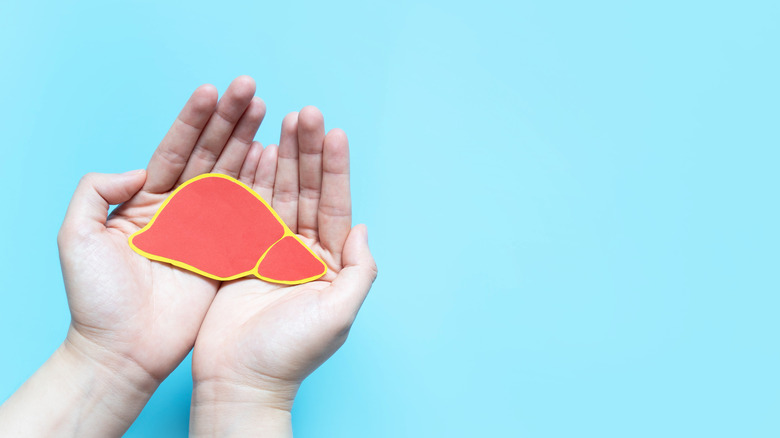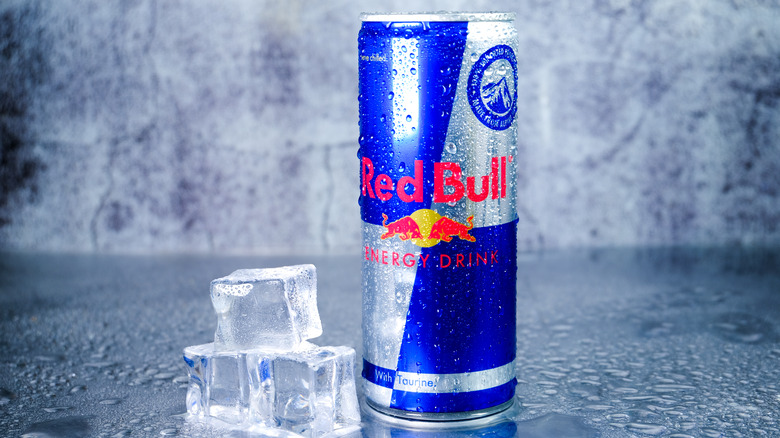When You Drink Energy Drinks Every Day, This Is What Happens
Let's be real. Life? It's tiring. Between the endless whirlwind of work, family, friends, and trying to keep up with the relentless pace of pop culture, it's a miracle that we make it to the end of each week in one piece. And when fatigue creeps in, an energy drink might seem like the perfect choice to pick you up. You wouldn't be the only person that thought so. Energy drinks are endlessly appealing choices amongst consumers, and are showing no signs of waning in popularity, with the size of the energy drink market in the U.S. alone having reached around 14 billion dollars in 2021 (per Statista).
But with all of those sales has come a lot of discussion about the health effects of energy drinks. Technically, an energy drink can be defined as "any drink that contains a stimulant compound," says Ohio State University Wexner Medical Center primary care sports medicine physician Larry Nolan to U.S. News & World Report. But the common understanding of an energy drink is a carbonated beverage that includes high levels of caffeine, sugar, other energy-boosting compounds, B vitamins, and added ingredients. And it's reasonable to wonder what drinking all of these things will do to your body, especially if you're cracking open energy drinks every day. Well, we've got the answers for you.
Drinking energy drinks every day could be bad for your teeth
Your alertness levels may thank you for drinking energy drinks, but your teeth definitely won't. Energy drinks can be notoriously damaging to tooth health and lead to significant tooth decay, largely down to their frighteningly high levels of acidity. "In all my years in dentistry I've found the leading cause of tooth decay in children to be juice, and in adults, it is energy drinks. Energy drinks, with a pH of roughly 3.2, are almost as acidic as battery acid, which has a pH of 1," explains dentist Bobby J. Grossi to Healthline. When you drink energy drinks, your tooth enamel comes into contact with the acidic liquid and can start to wear away.
After drinking an energy drink, your saliva's pH can also be altered for up to 30 minutes afterward, meaning that your enamel will continue to deteriorate long after you've swallowed. The acidic environment is also a haven for bacteria, which will thrive and multiply around your teeth and gums, leading to further, lasting damage. Bacteria multiplication is only made worse by energy drinks' often high sugar content. And if that's not enough, the stimulation caused by the drink can result in higher incidences of grinding teeth, wearing them down, and potentially causing tooth breakage, warns dentist Nammy Patel to Healthline.
Daily energy drinks can wreak havoc on your blood sugar and blood pressure
After drinking an energy drink, most of us feel that boost in vigor pretty potently. But the very ingredients that make us feel so buzzed can also affect our bodies significantly. Energy drinks can contain over 40 grams of sugar and 200 mg of caffeine per serving, according to the Harvard T.H. Chan School of Public Health. These two elements can cause a serious spike in blood sugar and a rapid increase in blood pressure, as observed in a study published in the International Journal of Environmental Research and Public Health.
As the study discusses, repeated use of energy drinks could be considered a risk factor for the longer-term development of cardiovascular disease due to their effects on blood pressure and blood glucose. Consuming too much sugar repeatedly can also lead to a host of other health consequences, and can impact your joints, teeth, skin, liver, kidneys, pancreas, and increase inflammation throughout the body (per WebMD). We'd say that's reason enough to watch your intake.
Consuming multiple energy drinks daily may increase your chance of migraines
Anyone who's had the misfortune to experience the blinding pain of migraines will be keen to do whatever they can to avoid them. If that's the case, you may want to steer clear of daily energy drinks. A study published in The American Journal of Medicine examined the link between drinking caffeinated beverages and migraine frequency. It was found that subjects who consumed a higher intake of drinks with caffeine in them had an increased likelihood of getting a migraine.
It should be pointed out, however, that the study only noticed a link between caffeine and migraines when participants were drinking three caffeinated drinks or more daily, says Medical News Today. For people who were only drinking one or two caffeinated beverages a day, the caffeine didn't seem to cause migraine symptoms. Caffeine in smaller amounts can even help to reduce headaches, thanks to its anti-inflammatory effect that eases tension around the brain, which is why you may see it used in combination with anti-inflammatory medications, says WebMD. The most important thing to do is to keep an eye on your body's specific reaction to caffeine and energy drinks, and taper your consumption down if you're suffering headaches or other ill health effects.
A daily energy drink may increase anxiety levels
We've all been there. That jittery, nervous feeling after drinking too much coffee. There's a delicate balance between feeling awake after drinking caffeine and experiencing anxiety, and if you're drinking energy drinks every day, you may encounter more of the latter. A study published in Depression and Anxiety noticed a clear link between energy drink consumption and increased anxiety levels, notably when taking into account pre-existing mental health factors.
If you're noticing that you're having more anxiety, particularly if you suspect that it's a result of drinking energy drinks, the first thing to do is to check how much caffeine you're consuming. "While the response to caffeine varies, 400 milligrams or above is generally the amount considered excessive for adults," advises UW Medicine Heart Institute cardiac electrophysiologist Arun Sridhar to Right as Rain by UW Medicine. Once you've gone over the edge with caffeine, it's often a matter of waiting until the levels reduce in your system, but simple things like drinking more water, taking a walk, or breathing deeply can help to ease anxiety symptoms. And, of course, make sure you stop the consumption of caffeine entirely until you feel more level.
Consuming an energy drink every day may result in kidney damage
Our kidneys are on the frontline of a lot of bodily processes, helping filter waste, protect bone health, and regulate blood pressure (per the National Kidney Foundation). Keeping our kidneys in good health is therefore essential, and drinking energy drinks every day may put them in harm's way. One reason why energy drinks are so impactful on the kidneys is because of their high caffeine levels, states Livestrong. The caffeine in these drinks causes increased urination, which in turn contributes to dehydration. This can lead to increased strain on the kidneys, and a potential deterioration of kidney function over time, as Kidney Research UK states.
And if you have a pre-existing renal condition, energy drinks may be best avoided. A key consideration is that energy drinks can often contain higher levels of potassium and sodium, as part of a collection of electrolytes intended to rehydrate and boost exercise performance — but these can be harmful to individuals following the renal diet, as the Cleveland Clinic discusses. Research published in the Journal of Renal Nutrition indicates that it's important to talk to your healthcare professional before drinking any energy drinks if you have a renal condition.
Energy drinks can help increase your mental performance
Energy drinks can be marketed with the sense that one sip will help you focus and achieve your potential — be that on the track, or in the library. It's gotta be that energy drink that did it, right? But in fact, energy drinks do help with performance and focus, and not just when it comes to exercise. Drinking energy drinks daily could help boost your mental function and ability to complete tasks optimally, according to research published in Nutrition Reviews.
The research notes that across several studies, energy drinks have been found to improve "mental and cognitive energy," helping to improve attention, boost memory, and positively affect executive function. What's less clear, as the research states, is how additional ingredients in energy drinks that are typically used to market their energy-boosting properties, like taurine or L-theanine, interact with caffeine to improve mental performance. It's therefore concluded that further study needs to be done on the interactions between these ingredients specifically, but for now, it's the caffeine in the drink that really gives you a mental kick.
Drinking energy drinks every day could increase your risk of developing cancer
With almost four out of 10 adults being diagnosed with cancer at some point in their lives (per the National Cancer Institute), it's important to consider how our diets may affect our risk of developing the disease. Unfortunately, drinking energy drinks every day may increase your risk of developing cancer — and this is the case even if the beverage is marketed as a "healthy" option. It's often assumed that "sugar-free" or "low-calorie" options are healthier, less risky choices, but these types of drinks often gain their sweetness from artificial sweeteners. As a large-scale study published in PLOS Medicine discusses, consuming artificial sweeteners like aspartame and acesulfame-K has been associated with a higher chance of cancer development. The study does point out, however, that this doesn't mean that there's a direct relationship between the two.
So what about if you're drinking energy drinks with sugar in them? Unfortunately, it's not much better. Another study looking at a larger population size shows that drinking sugary drinks has also been linked to a higher risk of cancer, specifically breast cancer (via The BMJ).
Daily energy drinks can cause an impact on your gut health
We've got a potentially outsized amount of love for our guts, but come on folks, they're great. Maintaining good gut health is paramount to good health in general, and feeding our guts a balance of prebiotic and probiotic goodness helps hugely (via Healthline). Unfortunately, there are things that our gut doesn't love, and energy drinks are one of them. This is largely thanks to the caffeine in the drinks, which can cause "gastritis, inflammation, increased gut motility, and diarrhea," says registered dietitian nutritionist and "The Protein-Packed Breakfast Club" author Lauren Harris-Pincus to Eat This, Not That!. Additionally, caffeine can activate the muscles in your gut that cause food to move through more rapidly, leading to looser stools, says University of Michigan Health.
The sugar in energy drinks can also cause digestive issues, especially if you have pre-existing conditions relating to your digestion. People with irritable bowel syndrome (or IBS) may find that the high levels of sugar in energy drinks make symptoms worse due to the sensitivity it can cause in the gut, says Healthline. Caffeine intake may also exacerbate IBS symptoms and potentially cause diarrhea, according to Johns Hopkins Medicine.
Energy drinks may improve your effectiveness during exercise
A huge part of the appeal of energy drinks is in their purported effects on exercise, which explains the common marketing thrust of these products (if you're really lucky, you'll get The Rock to appear in your ads to suggest just how impactful they are on your workout gains). But do energy drinks actually make you better a better athlete? According to a research review published in Nutrients, they may well do. The authors point out that several studies have found a positive link between moderate energy drink consumption and better athletic quality across a range of sport types. This is thanks not only to the caffeine in these drinks, but also to the taurine in some energy drink products, which may help to improve physical capacity (per the Mayo Clinic). Some energy drinks may also contain electrolytes, which can help for both sports performance and recovery, as research published in the Journal of Sports Sciences points out.
However, while the research does indicate the positives of energy drinks for sports, it also points out the potential health risks associated with drinking these beverages, especially in higher quantities. In particular, authors of the research review in Nutrients highlight the heightened chance of developing cardiovascular diseases.
Energy drinks may impact your heart health
If you've ever had one too many coffees and felt that pounding sensation in your chest, you'll know how profoundly caffeinated drinks can affect your heart. And energy drinks are no different. Daily consumption of them can potentially impact your heart in negative ways, perhaps even more than other caffeinated drinks, due to their additional ingredients.
This effect was seen in research published in the Journal of the American Heart Association, which looked at the impact of energy drinks on blood pressure and heartbeat regularity. The researchers observed that after drinking energy drinks, the change in how long it took the heart to generate a beat was significant, resulting in dangerous, potentially fatal, arrhythmia. Energy drinks caused a change to the heart more potent than a drink that just had caffeine in it, states the lead author of the study and the University of the Pacific's Thomas J. Long School of Pharmacy and Health Sciences professor of pharmacy practice Sachin A. Shah in the study news release (via American Heart Association). He noted, "We urgently need to investigate the particular ingredient or combination of ingredients in different types of energy drinks that might explain the findings seen in our clinical trial."
Having an energy drink every day can significantly raise your caloric intake
It's easy to assume that energy drinks are less substantive, calorie-wise, than food. After all, it's a drink – and a type of drink frequently associated with sports and exercise. But energy drinks can be surprisingly high in calories, sometimes jaw-droppingly so, thanks to their ample sugar content. Some cans of energy drinks can contain upwards of 200 calories per serving, with dozens of grams of sugar, as Eat This, Not That! shows. The worst offender on this front, Rockstar, can contain a shocking 59 grams of sugar per serving, with 278 calories per 16-oz can. That's over 14 teaspoons of sugar, FYI, or roughly a third of a cup.
While calories are not necessarily a bad thing in themselves, ones that come from added sugar, like in energy drinks, are considered "empty calories" with no nutritional value (per Medical News Today). Not only can consuming empty calories cause weight gain, it may also impact your nutrition elsewhere, leading to a less healthful diet that may be lacking in the nutrients you need. It's worth thinking about the impact of these additional sugars if you're drinking these beverages daily, or else opting for a healthier choice. Look for an energy drink that "ideally has zero [sugar], but definitely less than 10 grams per 8-ounce serving. If you're going higher than that, I would only use it prior to exercise," recommends nutrition expert Mike Roussell to Eat This, Not That!.
Drinking large amounts of energy drinks daily may impact your liver
Our livers are one of the unsung heroes of our body, and they deal with a lot, from helping convert food into energy to being involved in the detoxification process of the body, to supporting our immune systems (per Healthline). But drinking energy drinks daily may not entirely support liver health, and in certain cases, excessive energy drink consumption has been associated with serious health consequences.
A review of research published via LiverTox: Clinical and Research Information on Drug-Induced Liver Injury discusses several studies that have seen individuals experience severe, acute liver injury following large consumption of energy drinks. One such study discussed saw a previously healthy 50-year-old man present with acute hepatitis symptoms after drinking 4-5 energy drinks a day. The LiverTox review notes that this probably isn't down to the caffeine in the energy drinks themselves, as caffeine hasn't been linked to hepatic conditions. It also discusses the fact that the ingredients that potentially caused these liver conditions in patients weren't entirely clear.
Having energy drinks every day may be a sign of dependency
Plenty of people around the world don't feel they're firing on all cylinders until that first cup of coffee, and the same can be said for people who drink energy drinks every day. But if you're finding that you need daily energy drinks daily, it could be an indicator of dependency. Energy drink dependency or addiction is classified as a food addiction, and may be due to several ingredients in the drinks, like caffeine, artificial sweeteners, or sugar, all of which can be habit-forming (per Healthline). Some of the ingredients in energy drinks cause dopamine release, making you feel good — but as this effect lessens over time, you may find that you need to drink more of them to generate the same impact.
Psychological factors can also come into play. If you're used to drinking energy drinks to get stuff done, for example, it may be difficult to envisage getting through your day without them. If you're experiencing strong urges to drink energy drinks, or are finding it hard to cut down on your intake, it's important to discuss your options with your doctor.
If you or anyone you know is struggling with addiction issues, help is available. Visit the Substance Abuse and Mental Health Services Administration website or contact SAMHSA's National Helpline at 1-800-662-HELP (4357).

